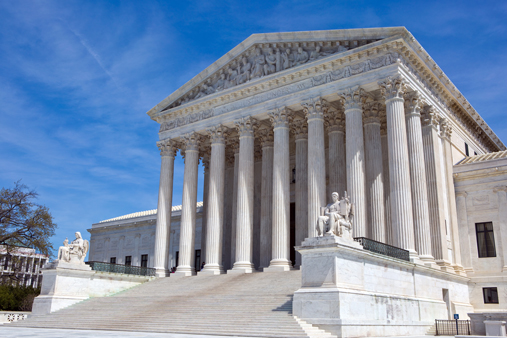On July 26, 2013, the D.C. Circuit Court of Appeals in a 2-1 decision, dismissed a lawsuit by states, manufacturers and utilities that contested five EPA rules (collectively, “challenged GHG rules”) related to the incorporation of greenhouse gas requirements into PSD programs within State Implementation Plans (SIPs). Texas, et. al. v. EPA, No. 10-1425 (D.C. Cir. July 26, 2013). The Petition was dismissed on the basis that petitioners lacked standing.
The challenged GHG rules included:
- SIP Call Rule – 75 Fed. Reg. 77698 (December 13, 2010) –EPA determined 13 SIPs to be “substantially inadequate” because greenhouse gases were not included in the states’ existing PSD programs.
- Failure Finding Rule– 75 Fed. Reg. 81,874 (December 29, 2010) – EPA found that 7 states had failed to correct their “substantially inadequate” SIP by the established deadline.
- FIP Rule– 75 Fed. Reg. 82,246 (December 30, 2010) – Because several SIPs remained without provisions to issue PSD permits for greenhouse gas, EPA issued a Federal Implementation Plan (FIP) that allowed EPA to issue PSD permits for greenhouse gases in those states.
- Interim Error Correction Rule – 75 Fed. Reg. 82,430 (December 30, 2010) – EPA changes its previous Texas SIP approval to a partial disapproval on the basis that Texas failed to address pollutants that were to be regulated in the future.
- Error Correction Rule – 76 Fed. Reg. 25,178 (May 3, 2011) – The Interim Error Correction Rule for the Texas SIP became final without substantive changes.
Background
On Jan. 2, 2011, the Tailpipe Rule, which regulated greenhouse gases from cars and light trucks, became effective. See 75 Fed. Reg. 25,324 (May 7, 2010). Once effective, greenhouse gases became a regulated pollutant, and per an EPA determination, facilities emitting specified amounts of greenhouses gases became subject to PSD permitting requirements. See 75 Fed. Reg. 17,004, 17,019 (April 2, 2010) (upheld by the D.C. Circuit in Coalition for Responsible Regulation, Inc. v. EPA, 684 F.3d 102, 129-44 (2012)).
On Dec. 13, 2010, EPA found that 13 States had “substantially inadequate” SIPs because they did not apply their PSD program to greenhouse gases. See SIP Call Rule. The states were given time to submit SIP revisions but on Dec. 29, 2010, EPA found that seven SIPs did not adequately include greenhouse gases in their PSD program. See Failure Finding Rule. Because the SIPs did not provide adequate authority to issues PSD permits that covered greenhouse gases, EPA issued a Federal Implementation Plan (FIP) to allow EPA to serve as the permitting authority for the greenhouse gas portion of any PSD permits needed for construction of major sources.
Petition for Review
The petitioners, which included the Utility Air Regulatory Group, the National Association of Manufacturers, states, and electric utilities had two main challenges: 1) a SIP cannot be “substantially inadequate” under CAA § 110(k)(5) because it lacks a requirement that did not exist at the time the State submitted its SIP to EPA; and 2) states have three years to incorporate the new greenhouse gas requirements into their SIPs under 40 C.F.R. § 51.166(a)(6)(i). Texas, et al. v EPA, No. 10-1425 at 33. The industry petitioners also argued that they were injured by the challenged rules because they “would not have been subject to PSD requirements for greenhouse gases in those several States until they revised their SIPs and EPA approved them.” Id. at 34-35. The state petitioners claimed they were injured because the EPA rules impacted their “quasi-sovereign interest in regulating air quality within their borders.” Id. at 35-36.
The Court of Appeals addressed Part C of the Clean Air Act, which requires that each SIP “shall contain emission limitations and such other measures as may be necessary . . . to prevent significant deterioration of air quality in each region . . . .” 42 U.S.C. § 7471. The Court found Part C to be “unambiguously self-executing with respect to newly regulated pollutants, and apply directly to major stationary sources irrespective of the applicable SIP . . . .” Id. at 33.
Once established that the PSD requirements for greenhouse gases applied directly to stationary sources, the Court turned to the issue of petitioners’ standing to challenge the GHG rules. To have standing, a petitioner must demonstrate “it has suffered a concrete and particularized injury that is imminent and not conjectural, that was caused by the challenged action, and that is likely to be redressed by a favorable judicial decision.” Id. at 34. The Court of Appeals found that the industry petitioners did not have standing because the challenged GHG rules “mitigated the injury that otherwise would have occurred when industry petitioners could not obtain lawful PSD permits in those States.” Id. at 35. Likewise, the state petitioners were also found to be without standing because
vacatur of the rules would not restore either State’s ability to issue necessary PSD permits with greenhouse gas requirements for construction of major emitting facilities but would result in a construction moratorium until they submitted revised SIPs that EPA approved. State petitioners have not suggested a moratorium would redress their claimed injuries.
Id. at 36.
The full text of the D.C. Circuit Opinion may be found here.
For more information, contact the Barnes & Thornburg attorney with whom you work, or one of the following attorneys in the firm’s Environmental Law Department: Tony Sullivan at tsullivan@btlaw.com or (317) 231-7274; Charles Denton at charles.denton@btlaw.com or (616) 742-3974; or Joel Bowers at jbowers@btlaw.com or (574) 237-1287.
Visit us online at http://www.btlaw.com/environmental.
© 2013 Barnes & Thornburg LLP. All Rights Reserved. This page, and all information on it, is proprietary and the property of Barnes & Thornburg LLP. It may not be reproduced, in any form, without the express written consent of Barnes & Thornburg LLP.
This Barnes & Thornburg LLP publication should not be construed as legal advice or legal opinion on any specific facts or circumstances. The contents are intended for general informational purposes only, and you are urged to consult your own lawyer on any specific legal questions you may have concerning your situation.











/Passle/6488d4630e7e25c9ac9f834a/MediaLibrary/Images/2024-07-18-19-15-33-047-669969d52008239f764a11af.png)


/Passle/6488d4630e7e25c9ac9f834a/SearchServiceImages/2024-07-17-15-17-44-967-6697e0980752df56d2441ada.jpg)
